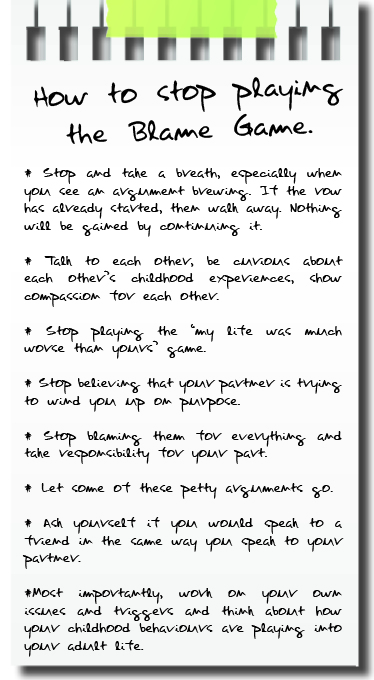When couples come to me for help with their relationship, they have often got into a run of negative fixed patterns of behaviours and ways of relating to each other. However hard they try, they don’t know how to get off the hamster wheel. Arguments are frequent, often over the same seemingly petty issues. But they never get resolved.
There is one common denominator – they start by playing the blame game.
They tell me the problems are due to their partner’s failings.
●He’s always late
●I have to do the lion’s share of the chores
●She doesn’t want to have sex anymore
●He doesn’t organise anything
●She doesn’t listen to me when I tell her how she should do things
●He never listens to me
●She doesn’t respect me
●He never tells me I look nice
●He’s always out with his friends and never wants to be with me
●She’s always on her mobile
●It’s always her ‘time of the month’ – always in a mood
●He’s always working and tired
The list goes on.
This blaming doesn’t help, because all it does is make the other one feel inadequate.
Blame makes us feel like we’re alone, like somehow we can’t measure up. Blame is so hard on relationships that marriage researcher Dr. John Gottman describes it as one of his “Four
Horsemen of the Apocalypse” — the four behaviours that cause the most trouble in relationships.
They are described as – Criticism, Defensiveness, Contempt and Stonewalling.
As a result of the criticism, the others follow in quick succession as each person sees the problem as the other person’s doing. As the battle lines are drawn, each uses the only weapons they have to hand, and each defends themselves, and counterattacks. As the battle continues, because the issues aren’t resolved each becomes contemptuous of the other, and when the war of words fails to resolve the problems, the silent treatment is the next weapon of choice – stonewalling.
Many of the couples who come to me then want me to ‘fix’ their partner. Simply because they see their partner as the problem. They figure that if only their partner changed everything would be fine. They expect me to join in playing the game, often spending whole sessions giving one example after another of their partner’s failings.
‘You see what I have to put up with – You see how awful they are to me – this is what I have to put up with day after day’…….
They have no idea of how their reactions feed the game, no concept that it might not be all their partner’s fault.
The thing is that the constant bickering and petty arguments are hiding a much deeper hurt, which isn’t being expressed. It’s the meaning behind the arguments that is really important.
It’s time to roll up my sleeves and find out what’s really going on underneath the surface.
Quite often it’s because one or both aren’t getting their needs met. Those petty complaints are really just the symptoms, and treating the symptoms isn’t going to result in any long-term resolution.
So, what are the deeper issues that are not being shared?
They are likely to be one of the following –
● ‘I don’t think you really care about me’
● ‘I’m scared you are going to leave me’
● ‘I can’t trust you to be there for me’
● ‘I’m unsure you will have my back’
● ‘I don’t matter to you’
They often aren’t expressed because the person doesn’t realise what is really going on beneath the surface themselves, or they are frightened of getting the same reaction they have before. The problem is by not dealing with the root of the problem, they are likely to get the same unsatisfactory results.
We all carry baggage, we collect it as we travel along in life. Mostly it starts in our childhood unless you were one of the few fortunate ones whose parents provided you with what is called a Secure Attachment. This means that they provided a secure and safe environment, where the child learned they could trust and rely on their parents. As a result, the child would grow into a confident adult, with healthy self-esteem. seeing the world around them and people within their world as trustworthy. The fact is that not many of us were lucky to experience that.
Let me say at the outset, ‘our parents did the best with the tools they had’. I’m not looking to demonise parents, only to help make sense of our actions. Our parents learned parenthood from their parents, who in turn learned from theirs. Although over generations some behaviours have been modified. For example, beating or smacking a child is certainly unacceptable now, there are many similarities from generation to generation. It’s really interesting to look back and have conversations with your parents if you are able to.
The problem is that most of us didn’t have those secure attachment experiences. Many parents, whilst providing the basic needs like food, clothing, a comfortable bed, access to
education etc. may not have been emotionally available.
So what happens when we didn’t have that secure attachment experience? Well, we are likely to lack self-esteem, and because we hadn’t felt safe and secure in our childhood, we aren’t going to see the world as a safe place as an adult, or in our relationships.
Let’s look at Carol and Peter for example. They constantly argue, over just about anything and everything.
Together we explored each of their childhood experiences.
It seems Peter’s father was a very strict disciplinarian, and Peter got the blame for anything and everything, even when one of his siblings was to blame. It really didn’t matter how much Peter tried to protest, and plead his innocence, his father just wouldn’t listen. So, what was the point in trying to get justice anymore? Peter realised there was no point in trying to
speak up so he withdrew and internalised his emotions. When he did speak up he got punished again, often physically. So he developed a way of protecting himself – he stonewalled his parents.
Carol, on the other hand, grew up as the middle child of seven. Her mother had been in several relationships, and the children were from several different fathers. So, as a child, Carol saw the male role models in her family constantly changing and then leaving.
So, that’s what she expected from her adult relationships. Additionally, because she had so many siblings she had to fight to get herself heard. So, she would shout until someone listened to her, which still didn’t happen.
So, these childhood coping strategies are being played out in their current relationship. Carol shouts at Peter, but it has the effect of Peter withdrawing, and so the cycle continues. As
Carol tries to get a response from Peter, he withdraws even further, and then each brings out the heavy weaponry. ‘I’M LEAVING!‘
Carol had been abandoned many times by the men in her life as a child. So, she reads this threat as yet another man who she can’t rely on. There are times when she makes the threat because she is going to get in there first before Peter can leave her.
Peter feels continually punished, and so the only solution to make this situation stop is to threaten to leave.
This is mostly played out of our awareness unless you have done some work on yourself. Even then we can still be triggered. Unless we stop playing the blame game and making it all about the other person the game will continue.
The problem I see with so many couples is that they are so caught up with their own unresolved wounds from the past, they are unable to stop and see what is really going on.
Added to which, it’s so much easier to see the negatives in our partner, and actually it’s the way we are programmed to keep us safe from danger.












